Effects of 1-methylcyclopropene, methyl jasmonate and salicylic acid on physicochemical properties and wooliness of nectarine fruit during cold storage
- PMID: 39701964
- PMCID: PMC11658171
- DOI: 10.1186/s12870-024-05939-z
Effects of 1-methylcyclopropene, methyl jasmonate and salicylic acid on physicochemical properties and wooliness of nectarine fruit during cold storage
Abstract
Background: Owing to its high perishability, the market life of nectarine fruit is very short. Cold storage is a principal approach to limit post-harvest quality loss in nectarines. The objective of this research was to evaluate the impact of postharvest methyl jasmonate (MeJA), salicylic acid (SA) and 1-methylcyclopropene (1-MCP) on quality properties of nectarine fruit, specifically weight loss, firmness, phenolics and antioxidant activity, following cold storage and subsequent shelf life. Fruit immersed in water were considered as control. The fruit were stored at 0 ± 0.5 °C and 90 ± 5% RH for 56 d, then kept at 20 ± 0.5 °C and 70 ± 5% RH for 2 d in shelf life.
Results: The results demonstrated that single or combined treatments of MeJA, SA and 1-MCP were effective on quality characteristics. During cold storage, fruit treated with MeJA + 1-MCP (3.66%) and SA + 1-MCP (3.54%) exhibited lower weight loss than the control (4.08%). In the final two measurements of storage, the flesh firmness of fruit treated with SA + 1-MCP (54.5 and 54.06 N, respectively) was higher than that of the control. At the end of cold storage, the SA + 1-MCP treatment (17.4%) exhibited higher soluble solids than the control (15.37%) and SA (15.20%) treatments. However, the total phenolics content was found to be higher in nectarine fruit treated with single SA than in the control, as well as in fruit treated with SA + 1-MCP and single 1-MCP. Wooliness in fruit treated with 1-MCP, SA and MeJA was found to be lower than in the control, while fruit had higher acceptance.
Conclusions: As a result, the SA + 1-MCP and MeJA + 1-MCP treatments were more efficacious in retarding the weight and firmness decline of nectarine fruit during storage. Also, it was revealed that 1-MCP, SA and MeJA could be employed as efficacious instruments in nectarine fruit with respect to wooliness and acceptance, which influence consumer preferences.
Keywords: Antioxidant; Flesh firmness; Phenolics; Plant growth regulators; Weight loss.
© 2024. The Author(s).
Conflict of interest statement
Declarations. Ethics approval and consent to participate: Not applicable. Consent for publication: Not applicable. Competing interests: The authors declare no competing interests.
Figures
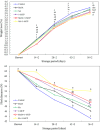
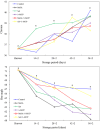
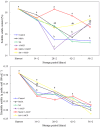
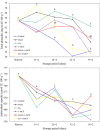
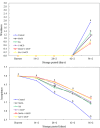
References
-
- Obi VI, Barriuso JJ, Gogorcena Y. Peach brown rot: still in search of an ideal management option. Agriculture. 2018;8(8):125. 10.3390/agriculture8080125. - DOI
-
- Karaman S, Ozturk B, Genc N, Celik SM. Effect of preharvest application of methyl jasmonate on fruit quality of plum (Prunus salicina L indell cv. Fortune) at harvest and during cold storage. J Food Proc Preser. 2013;37(6):1049–59. 10.1111/j.1745-4549.2012.00805.x. - DOI
-
- Chen C, Sun C, Wang Y, Gong H, Zhang A, Yang Y, Li X. (2023). The preharvest and postharvest application of salicylic acid and its derivatives on storage of fruit and vegetables: A review. Sci Hortic. 2023;312:111858. 10.1016/j.scienta.2023.111858
-
- Blankenship SM, Dole JM. 1-Methylcyclopropene: a review. Postharvest Biol Tech. 2003;28(1):1–25. 10.1016/S0925-5214(02)00246-6. - DOI
-
- Özkaya O, Yildirim D, Dündar Ö, Tükel SS. Effects of 1-methylcyclopropene (1-MCP) and modified atmosphere packaging on postharvest storage quality of nectarine fruit. Sci Hortic. 2016;198:454–61. 10.1016/j.scienta.2015.12.016. - DOI
MeSH terms
Substances
LinkOut - more resources
Full Text Sources
Research Materials
Miscellaneous

